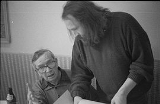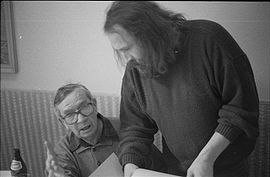
Ivan Diviš
Encyclopedia

Biography
He was born to a family of a bank officer. While he was studying at high school in PraguePrague
Prague is the capital and largest city of the Czech Republic. Situated in the north-west of the country on the Vltava river, the city is home to about 1.3 million people, while its metropolitan area is estimated to have a population of over 2.3 million...
during World War II
World War II
World War II, or the Second World War , was a global conflict lasting from 1939 to 1945, involving most of the world's nations—including all of the great powers—eventually forming two opposing military alliances: the Allies and the Axis...
he was arrested by Gestapo
Gestapo
The Gestapo was the official secret police of Nazi Germany. Beginning on 20 April 1934, it was under the administration of the SS leader Heinrich Himmler in his position as Chief of German Police...
and imprisoned in Pečkárna and Pankrác
Pankrác
Pankrác is a neighborhood of Prague, Czech Republic. It is located south of the city centre on the hills of the right bank of the Vltava River and is part of the Prague 4 district as a deal of Nusle quarter. The name derives from the local baroque initially very old church of St Pancras, which is...
. Since 1942 he worked in a bookstore, and in the end of the war he was employed at V. Petr publisher. After passing maturita he studied philosophy and aesthetics at Charles University (1945–49). In the early 1950s he worked as a corrector at Communist Rudé právo
Rudé právo
Rudé právo was the official newspaper of the Communist Party of Czechoslovakia....
newspaper. After 1953 he worked as a latheman in Liberec
Liberec
Liberec is a city in the Czech Republic. Located on the Lusatian Neisse and surrounded by the Jizera Mountains and Ještěd-Kozákov Ridge, it is the fifth-largest city in the Czech Republic....
and Prague-Kbely. In the 1960s he was an editor of Mladá fronta publishing house. In 1964 he converted to be a Roman Catholic. After the Prague Spring
Prague Spring
The Prague Spring was a period of political liberalization in Czechoslovakia during the era of its domination by the Soviet Union after World War II...
reverse he emigrated to West Germany
West Germany
West Germany is the common English, but not official, name for the Federal Republic of Germany or FRG in the period between its creation in May 1949 to German reunification on 3 October 1990....
in 1969 and worked for Radio Free Europe
Radio Free Europe
Radio Free Europe/Radio Liberty is a broadcaster funded by the U.S. Congress that provides news, information, and analysis to countries in Eastern Europe, Central Asia, and the Middle East "where the free flow of information is either banned by government authorities or not fully developed"...
. He lived in Munich
Munich
Munich The city's motto is "" . Before 2006, it was "Weltstadt mit Herz" . Its native name, , is derived from the Old High German Munichen, meaning "by the monks' place". The city's name derives from the monks of the Benedictine order who founded the city; hence the monk depicted on the city's coat...
.
Works
- Balada z regálu (1946, with Kamil BednářKamil BednárKamil Bednář was a Czech poet, translator, prose writer, dramatist and publishing house editor.-Life:After 1931, he studied law, and then 6 years of philosophy in Charles University...
, illustrated by Václav Bláha) - První hudba bratřím (1947)
- Uzlové písmo (1960)
- Rozpleť si vlasy (1961)
- Deník molekuly (1962)
- Eliášův oheň (1962)
- Morality (1963)
- Chrlení krve (1964)
- Umbriana (1965)
- V jazyku Dolor (1966)
- Povíme si to! (1967)
- Sursum (1967, 2nd edition 1987 in Munich)
- Thanathea (1968)
- Noé vypouští krkavce (1975 in Toronto, revised 1995)
- Přece jen (1977 in Munich)
- Křížatky (1978 in Munich)
- Průvan (1978 Pondicherry)
- Beránek na sněhu (1980, 1994 in Munich)
- Odchod z Čech (1981, 1990 in Munich)
- Žalmy (186, 1991 revised in London)
- Obrať koně (1987, 1992 in Tessing)
- Moje oči musely vidět (1991)

